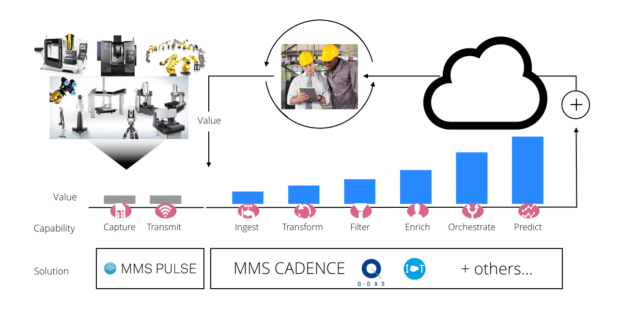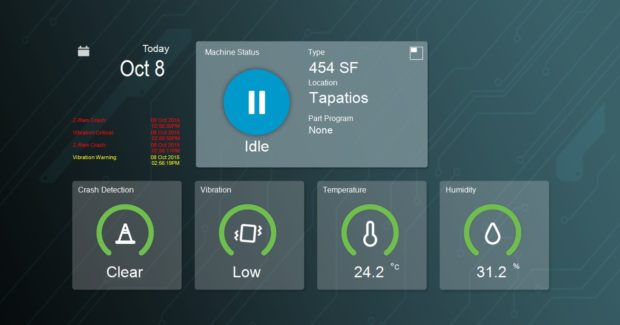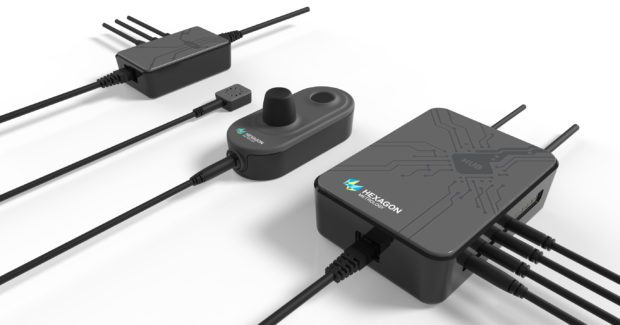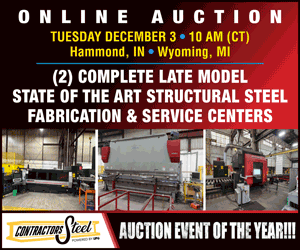Are You Ready for the Industrial Internet of Things?
Is your shop still stuck reacting to customer problems that have already happened? The power of smart manufacturing can make you more competitive by unleashing actionable CMM measurement data that alerts you and your customer at the same time that something has happened – so that you can respond proactively.
Posted: May 6, 2016
Industry 4.0, Industrial Internet, Industrial Internet of Things (IIoT) – whatever name you choose, it’s going to arrive sooner rather than later. Is your metrology process ready for the Industrial Internet era? The Internet of Things (IoT) can seem like an exotic topic, but many of you have already been introduced to an early IoT application. When the dreaded Check Engine light goes on in your car, you have firsthand experience with IoT functionality. Simply put, what happens when that light goes on is that a sensor reviews the state of the engine, detects a negative condition and then reports that your car needs a service appointment. As the technology has progressed, these systems have gotten more sophisticated, less expensive, and have ultimately found their way into many other applications.
THE CHECKLIST
To start, your business will need to become “Industry 4.0 ready” before you can adapt your measurement and quality approach to an IIoT world. In a nutshell, your manufacturing operations will need six critical things:
- Big data enabled.
- Digitally connected physical assets.
- Adopting a conditions-based maintenance schedule (vs. a traditional schedule-based approach).
- Access to predictive analytics (for visibility to operational efficiencies).
- Industrial internet readiness on your operation.
- An IIoT-ready security system that provides real-time threat intelligence services.
On a granular level, in order to implement an IIoT-ready manufacturing operation a shop requires the sensors, actuators and low-level devices that constitute the electronic hardware foundation of IIoT. Your factory must be connected to use the Industrial Internet; that is, it must have end nodes that are Internet Protocol (IP) enabled, or directly controlled by an IP enabled proxy device. These devices are necessary to collect useful data and make it actionable.
UNLEASHING DATA SILOS
Many times, data resides on an end device and it is not actionable. These data silos make an IIoT operation impossible – to get the power of IIoT, your business requires the ability to take the collected data and move it up the hierarchy for strategic use. Using this approach, Industry 4.0 drives productivity, and connected metrology is an essential element for success. With sensing, thinking and acting capabilities, modern metrology is engineered for leveraging actionable information to make business-critical decisions. Accurate, real-time information guides action that enables shops with the agility and insights to accelerate their throughput and exceed their quality goals.
For example, I work for a manufacturer of data-driven measurement solutions that includes portable and stationary coordinate measurement machines (CMMs). We started our own IoT journey about two years ago. We had observed the development of Industry 4.0, cloud technologies and UX (user experience) for many years, first in theory and later in practice. IoT was (and still is) generating an unparalleled amount of data, disrupting the industry in a good way. As manufacturers started to embrace a more data-driven approach, we needed to respond to client requests and market forces. Our customers increasingly wanted to connect to their measurement systems and gain more awareness of the environment their machines work in. This connectivity would unleash actionable data and provide valuable insights to help shops become increasingly proactive in their inspection processes.
OPENING THE DOOR TO IOT
IoT is a big topic. In order to successfully develop solutions ready for Industry 4.0, we started with the manufacturing environment. Why focus here first? In a word: accuracy. The environment defines the accuracy and successful operation of all CMMs. Environmental fluctuations in temperature, humidity and vibration have the biggest negative impact on accuracy. Environmental stability is essential for maintaining the quality of measurement data.
https://youtu.be/-Zgd4x2E3DE
We introduced our first IoT system last year as a real-time monitoring system that uses a network of sensors to record variations of environmental factors in the vicinity of a CMM. In addition to equipment status alerts and crash notifications, the platform creates a central hub of information to support metrology data gathered by the machine. Its sensor package can be customized to specific customer requirements and the information can be reconciled with anomalies in output data to make compensations as necessary. This capability gives a manufacturer the potential to improve productivity and ensure data integrity while also improving safety and security in modern shop-floor inspection conditions.
How does it work? Very simply, when there is a breach in temperature, humidity and vibration or a physical crash resulting from a breach, the CMM operator is notified immediately via email or Short Message Service (SMS). The system can also send a “pause routine” message to stop the machine from collecting data until the conditions return to the optimal level. This is the beginning of injecting low levels of “intelligence” into a CMM machine.
SMARTER MACHINES
During the product development process, we executed a large global user research study which also confirmed that our customers wanted help to make their machines “smarter.” What components found in the IoT process could make machines smarter? At the heart of our IoT system is the ability to connect to the cloud while gathering and reporting the operational data collected from CMMs. In other words, the value of IoT is its ability to capture CMM operational and environmental data, and make it actionable. Shops can use this information to proactively observe operations in real-time and use that information to improve productivity and safety by reducing unplanned down time.
The promise of IoT is to move the experience of operating CMMs from being purely reactive (meaning something happens, the customer calls, the shop reacts and puts the customer back in operation) to proactive (the shop is notified at the same time as the customer that something has happened through the connection to the CMMs via the IoT system) to a predictive posturing (the ability to forecast when the CMM itself needs service by using cloud connectivity to automate the service scheduling process and achieve a zero unplanned downtime status).
The illustration in Figure 1 shows how our IoT system acts as a “first mile” provider and a connector: information is captured, displayed and transmitted via the IoT system, then other software systems – such as PC-DMIS inspection software, Q-DAS statistical software or Salesforce IoT CLOUD – analyze the information and get to work on making it actionable. These environments ingest the data, transform and filter it, add additional information (statistics in Q-DAS), enrich it, and then pass it on to be orchestrated further. Each solution uses the outcome to predict and automate a process, creating immense value to the manufacturing enterprise.
FORGING AHEAD
Connecting more and more “things” with embedded sensors that relay information is only the beginning of an intelligent Industry 4.0 manufacturing environment. This intelligent data gives both metrology hardware and software the ability to learn from their surroundings. Over time, shops will be able to analyze and use current and historical data to become even more predictive, more proactive to optimize processes and remediate issues quicker. This is an exciting juncture in manufacturing technology and metrology environments. Many hurdles must still be overcome in this IoT technology revolution, but the potential to gain even more productivity is driving this train to go even faster.


















